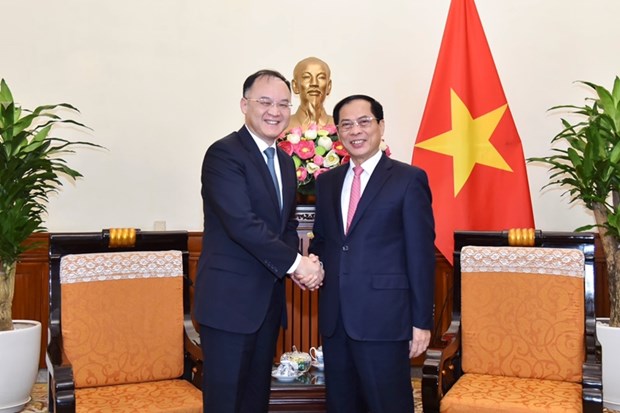Foreign Minister hosts Chinese Assistant Foreign Minister
VGP - Foreign Minister Bui Thanh Son suggested China continue increasing imports of Viet Nam’s commodities and farm produce and boost sustainable tourism cooperation.

Foreign Minister Bui Thanh Son (R) hosts a reception for Chinese Assistant Foreign Minister Nong Rong, Ha Noi, February 5, 2024 - Photo: VNA
Bui made the above suggestion on Monday while hosting a reception for Assistant Foreign Minister Nong Rong who is also Secretary General of the Steering Committee for Viet Nam-China Bilateral Cooperation.
The Vietnamese diplomat underlined the crucial and practical significance of jointly implementing high-ranking joint statements for the sake of their businesses, localities and people.
He welcomed and spoke highly of proposals put forth by Nong Rong to accelerate the bilateral ties in the time ahead.
The two counrties' Ministries of Foreign Affairs should uphold their roles as permanent agencies of the Steering Committee for Viet Nam-China Bilateral Cooperation and effectively carry out agreements to expand bilateral cooperation in the new period, said Bui.
The two ministries should work closely to enhance all-level exchange and contact activities; promote strategic development connections, and improve the quality and effectiveness of practical cooperation in 2024, he proposed.
He recommended China facilitate people-to-people links and local-to-local exchanges as well as foster collaboration with Viet Nam at multi-lateral mechanisms and forums.
Bui called on the two sides to respect each other's legitimate interests, in line with international law, especially the 1982 United Nations Convention on the Law of the Sea, to help maintain regional peace, stability, and development.
Nong Rong, for his part, said his visit aims to exchange views extensively and comprehensively with the Vietnamese Ministry of Foreign Affairs on measures, directions and tasks to boost bilateral relations in accordance with the common perceptions of their senior leaders.
China stands ready to work with Vietnamese agencies to maintain close exchanges and coordination and promote high-level strategic exchanges via visits and contacts of senior leaders, he reiterated.
He vowed to strengthen cooperation in the fields of diplomacy, defense and security and continue promoting practical cooperation with Viet Nam across all sectors, particularly strategic connectivity, cooperation in transport infrastructure, and trade facilitation.
Regarding sea-related issues, both sides underscored the importance of seriously implementing the agreements and common perceptions to better control and settle sea-related differences.
Both sides need to fully and effectively implement the Declaration on the Conduct of Parties in the East Sea (DOC), and promote substantive progress in the negotiations on a Code of Conduct (COC) in the waters, they noted./.
